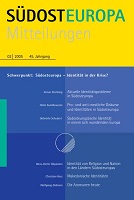Pro- und anti-westliche Diskurse und Identitäten in Südosteuropa
Pro- and Anti-Western Discourses and Identities in Southeast Europe
Author(s): Holm SundhaussenSubject(s): Politics / Political Sciences
Published by: Südosteuropa Gesellschaft e.V.
Keywords: anti-Occidentalism; the elites in the Balkans; EU-enlargement
Summary/Abstract: In this article, the „West“ and the „East“, the „Occident“ and the „Orient“ are not understood in terms of space but in terms of different sets of historical developments, cultures and values, which varied in time and space. Although the “Western” civilization has originally grown out of Western Europe, it is not restricted to this part of Europe. The same is true for anti-Occidentalism, which nowadays is called “Occidentalism” (in reaction to E. Said’s “Orientalism”) and which has its roots in the heart of Europe. From here it spread to Eastern Europe and the Balkans and then to the Middle East and other parts of the world. Like in 19th-century Russia, the elites in the Balkans are split in “Westernisers” and adherents to different kinds of anti-Western concepts. For the Balkans, these clashes are not yet systematically explored. The next EU-enlargement calls for a thorough analysis of pro- and anti-Western discourses in Southeast Europe and a common effort of all present and future EU-members to define a European identity that, for several reasons, should not be a combination of the Greek-Roman legacy with Christianity.
Journal: Südosteuropa Mitteilungen
- Issue Year: 2005
- Issue No: 02
- Page Range: 16-29
- Page Count: 14
- Language: German
- Content File-PDF

